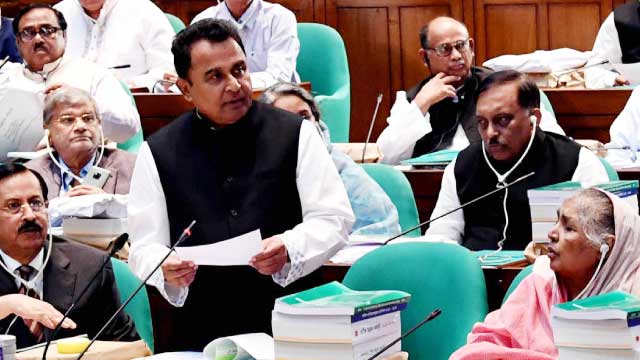Majority of the government’s budgetary targets for the fiscal year 2019-2020, including the annual development programme and revenue collection target, are likely to remain unachieved as all are unrealistic innature, observed economists and experts.
Former interim government adviser AB Mirza Azizul Islam and former Bangladesh Bank governor Salehuddin Ahmed pointed out that the government agencies actually did not have the capacity to implement the targets.
Unless the capacity of the agencies was improved, most of the budget goals would remain on paper, they said.
Finance minister AHM Mustafa Kamal on Thursday proposed a Tk 5,23,190 crore national budget with deficit of Tk 1,41,212 crore.
In the budget, government fixed Tk 3,77,810 crore revenue collection target including Tk 3,25,600 crore for the National Board of Revenue and annual development programme of Tk 2,02,721 crore for FY19.
Finance minister in his budget speech also mentioned that the government would try to increase Tax-GDP ratio from 10 per cent to 14 per cent in next two years by establishing revenue offices in every upazilas and growth centres.
GDP growth and inflation targets were set at 8.2 per cent and 5.5 per cent respectively for the upcoming fiscal.
Speaking about the implementation trend and target, former interim government adviser AB Mirza Azizul Islam and former Bangladesh Bank governor Salehuddin Ahmed mentioned that the target was not achievable considering the capacity of the NBR.
Mirza Azizul Islam said, ‘It has become a trend in the country that the government sets high target but fails to achieve and it will not be an exception in FY20.’ None of the targets were achievable, he said.
The revenue collection target for the NBR for FY20 was 35 per cent higher than the actual achievement in FY19 and the ADP target was around 40 per cent higher than the achievement, said Azizul, adding that the targets were unrealistic and could not be achieved.
Salehuddin Ahmed said that the implementation of the budget would be challenging considering the trend. The implementation situation has not improved, he said, adding that, ‘how then the targets would be implemented?’
He also mentioned that the revenue collection target set for the FY20 seems almost impossible considering the capacity of the NBR officials and the system it currently has in place.
Ultimately, the government will have to take loan from the banking sector and that would hamper the investment climate, he said.
In a statement, South Asian Network on Economic Modelling executive director Selim Raihan termed the proposed budget an ambitious one.
He said, ‘We expect clear guidelines and plans from the government how this budget is going to be implemented, given the fact that weak implementation of the budget has become a norm in recent years.
‘It is important to highlight how the performance of different ministries will be improved to implement this proposed budget,’ Selim, also a Dhaka University professor, said.
Although the size of the budget has been increasing, the implementation rate has been falling since FY11.
The implementation of the budget was 76.1 per cent in the fiscal year 2017-18, while the figure was 79.1 per cent in FY17, 80.8 per cent in FY16, 81.6 per cent in FY15, 84.6 per cent in FY14 and 90.8 per cent in FY3.
On the other hand, revenue collection, the main tool for budget implementation, has witnessed a major setback in the outgoing fiscal year 2018-2019.
Revenue collection grew by 7.27 per cent in the first nine months of the financial year 2018-19, against the overall target of about 44 per cent, with 50,367 crore shortfall.
Tax authorities managed to collect Tk 1,53,478 crore in July-March of FY19 against the target of Tk 2,03,845 crore for the period.
The target for the entire FY19 was set at Tk 2,96,201 crore, but was revised to Tk 2,80,000 lakh crore due to a slow state of collection.
As in the past several weeks, the implementation of the ADP was far behind the target as government agencies have managed to implement only 53 per cent of the total allocation under the ADP in the first 10 months of FY19, leaving implementation of the rest 47 per cent of the ADP for two months.
In FY19, government budget allocation was Tk 1,73,000 crore which has been revised to Tk 1,67,000 crore due to slow implementation.
Despite the sluggish implementation, the government increased the ADP target by 21.39 per cent.





